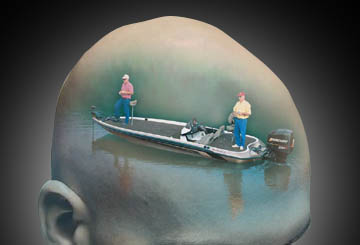Levels of the Game: Winning when you have to win

First off, I need to apologize to you, my readers. For the last couple of months I’ve been delinquent in getting out these Performance Psychology and Competitive Fishing columns. However, I have a reasonable excuse: I have been busier than usual with my own competitive fishing career.
The legal profession has an axiom that says, “A lawyer who tries to represent himself has a fool for a client.” The corollary in journalism is, “A writer who writes about himself has a clown for a subject.” With the exception of autobiography, writers are usually better off focusing on situations and people were they have at least a reasonable chance of being objective, authentic, honest.
However, this month I am going to break that rule and write about myself. I’m also going to break another cardinal rule of storytelling and give you the punch line first. I won the bass club championship this year. After seven of eight events, Steve and I were dead even in points. We had each won three previous tournaments. The last event was on a big-fish lake. I expected Steve to catch good fish, and he did. In order to beat him, I would have to catch big fish. Here is how the psychology of that event unfolded.
Like most of you, I had won competitive fishing events previously. Usually the scenario would play out like this: a) study the map of Lake X; b) talk with some of the club guys about seasonal conditions, fish location, water levels, lure options, etc.; c) practice-fish a time or two and locate a few fish; d) go fish the tournament. No real pressure, just do your best, don’t get too stressed out if you lose a fish, and keep trying different things until you figure out what the fish want that day. On occasion, that resulted in the best bag.
This past weekend, however, was different. At this point I had “waked up with a hand,” as they say in Texas Hold `Em. I had the chance to be the club champion and I really wanted that. You know what I’m talking about: bottom of the ninth, down by a run, two outs, a guy on base, and you’re up! All you need to do is hit the ball out of the park. No problem, eh? Like many of you, I’d been in competitive athletic events before, but until now I’d never had the chance to play for a championship.
To make this dream come true, however, I had to use my own advice about the psychology of competitive fishing. To begin with, I recognized and admitted to friends that I was a nervous wreck leading up to this last tournament. Talking about being tense and wanting to win helped some, and I did employ my relaxation exercises at different points during the week. I was eventually able to refocus and tell myself, “It’s just fishing, after all,” which helped calm my nerves and allow me to think more clearly about a game plan.
Practice had given me deep-water weedline fish as well as shallow slop fish, and I couldn’t decide where to start. The deep-water fish were easier to catch in practice, and there were a lot of them, but the shallow fish seemed bigger. I decided to start with the shallow fish, in part because they were near some visible cover that other people might have seen, and I didn’t want to fish behind someone else on that water.
Next I began to fret over what baits to start with. Jigs or frogs; frogs or jigs? Sometimes they miss the frog, and I didn’t want to lose any bites in this event. Jigs have a higher bites-in-the-boat ratio, but sometimes that jig hook comes out the top lip of the fish and gets hung up in the lily pads, whereas when they eat the frog, both hooks are often inside the fish’s mouth. OK, fine. Start with the frog and see how, or even if, they eat it. If they don’t, go with the jig.
But what color frog or jig? The water was pretty mucky in the pads last week. Better start with a black frog and a black-blue jig. The partner I drew turned out to be a very good deep-water guy, and so I figured he’d be a help if the shallow fish didn’t go.
Tournament morning! My first place to try is a small patch of water down a narrow channel off the main lake. As we take off, everybody heads away from that narrow channel except Jason, who lives about two miles from this lake. This is his home water?! NO! He’s going to my starting spot, I think, and sure enough he pulls up not 30 yards from where I caught my biggest fish in practice. Now I am freaking out, sad to say. I start throwing the black frog, oblivious to the fact that the water is a lot clearer this morning than it was last week. Three huge blowups in the first 10 casts, and I miss all three of them, while at the same time, my partner catches a good fish!
OK – time out for some serious emotional management. I sit down in the boat and tell myself, “This is an eight-hour tournament, and you have already found out that your fish are still here. Just slow down and catch them.” At this point, I mention to my partner that the water seems clearer than it was a week ago, and now that I’ve calmed down, it occurs to me that maybe the black frog isn’t the best choice. I switch to the frog I am most comfortable with in clear water (sorry, I can’t give you all the details!), and the next fish that swirls completely swallows Kermit. Yes! The first fish is in the boat. It’s not a toad, but it’s a start.
Now I’m back in fishing mode instead of stuck in Anxiety-ville; gradually the livewell begins to fill. As my mentor Loel has reminded me over and over, successful tournament fishing is about making good decisions. After an hour, it’s decision time again. We have covered the entire area once, and Jason has left so we have the place to ourselves. “Never leave good fishing to find great fishing” is an axiom of the commercial salmon fleet in Alaska as well as a mantra for tournament bass and walleye anglers everywhere. So with that in mind, I turned around and re-fished the same area again; and then again. Each trip we catch fewer fish, yet gradually I am improving my weight. So far the decisions have turned out to be decent.
It’s 10 o’clock – halftime. I better go check those deep-water fish. Run down the lake, get out on the weedline, break out the shaky heads and drop-shots. I talk to a few of the guys, and most people have two or three fish. I’ve been culling since 7:30. I like my chances against the field, but I haven’t seen Steve, the guy I have to beat. A full hour of weedline fishing, and not one decent strike. Time to go back to where we know the biters live.
Warm summer day, late July, the water skiers, kids on tubes, and jet skis are out in full force. Now this shallow-water area, churned up by all the boat traffic, takes on the murky, muddy color it had last week – in the afternoon. OK, I get it – with the water colored up, maybe the frog bite will turn back on. And sure enough, it does! Now the black frog is the right choice, and my weight is going up.
Now it’s 1 p.m., one hour left. As I cull my latest fish, I make a huge tactical error. Last season I had ordered the new Ardent culling system that allows you to see the weight of each fish you’ve tagged. But I was so anxious that I grabbed the wrong color/weight and threw back a fish 6 ounces larger than my smallest fish. Mega-stupid!
Still, the only thing to do is keep fishing. With the clock winding down, several other boats have found my area, and they are not only fishing nearby, they are wanting to chat. My partner keeps the banter going, but I tell myself, “This isn’t the time to talk. I still have a chance to catch fish.” Sure enough, just before I need to leave for the weigh-in, a good bass eats my jig and I can cull my mistake. Steve ended up with 13.06 pounds, Bob had 13.69, and my total was 15.64.
The lessons are these: a) The best way to learn something is to teach it to someone else. I hope your fishing has improved because of this column series; I know mine certainly has; b) Success truly is about making good decisions, so think through your options, be realistic about what you know, and don’t be afraid to admit you’re wrong and change. Roland Martin once told me that what he starts with in a tournament is almost never what wins the event; c) In the end, it’s just fishing. Be alert on every cast, pay attention to as many details as you can, and remember that relaxed athletes perform better than tense ones.

————————————————–
Jay T. McNamara, Ph.D., L.P., also known as Dr. Fish, recently finished his book “The Psychology of Exceptional Fishing.” You can order it by contacting Jay via e-mail at this address: [email protected].
————————————————–
Jay T. McNamara, Ph.D., L.P., is a psychologist, who is also an avid bass and walleye angler. With more than 26 years of professional experience complemented by participation in competitive fishing at local and national levels, he is uniquely qualified to illustrate how performance psychology principles apply to tournament fishing.